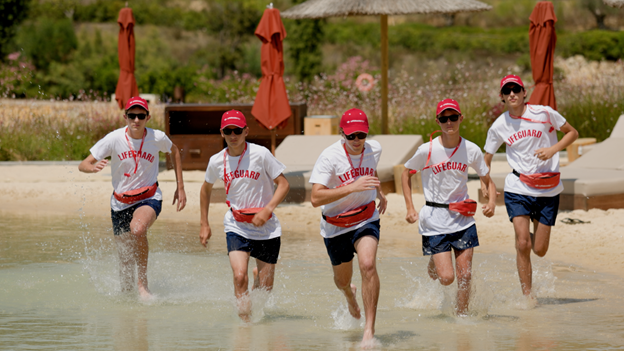Lifeguarding is much of the time saw as a basic and mindful job that requires solid swimming skills and speedy reflexes. However, being a lifeguard offers definitely something beyond lifesaving information — it conveys many physical benefits that can significantly work on your general fitness and health.
If you want to become a lifeguard then search for “lifeguard certification near me” or considered the stuff to remain fit as a lifeguard, this article explores the key physical advantages that come with this role.
Full-Body Strength and Conditioning
Lifeguards are expected to perform physically requesting undertakings, like swimming significant distances, safeguarding individuals in trouble, and overseeing emergency circumstances. These exercises call for uncommon strong endurance and in general body strength.
One of the center liabilities of a lifeguard is swimming in flighty water conditions, whether in a pool, sea, or lake. This continuous swimming creates center muscles, particularly the abs, lower back, and hips, while additionally captivating the legs, shoulders, and arms. Regular swimming exercises, which are a huge piece of lifeguard training and day to day obligations, help to fabricate fit bulk, tone the body, and improve cardiovascular endurance.
Additionally, lifeguards frequently need to lift and convey people, sometimes gauging as much as or more than themselves. This requires chest area strength, which is regularly sharpened during training sessions and rescue situations. Thus, lifeguards will quite often have amazing by and large solid equilibrium, which safeguards against wounds and works on regular usefulness.
Cardiovascular Fitness and Stamina
The job of a lifeguard frequently includes extended periods of time of watching and watching out for swimmers. However, when emergencies happen, lifeguards should get a move on and perform physical undertakings at full limit. These unexpected explosions of energy, for example, running or plunging into the water, require elevated degrees of cardiovascular endurance and stamina.
Training for lifeguards regularly includes timed swims and stop and go aerobic exercise (HIIT), the two of which further develop heart health and cardiovascular effectiveness. By further developing lung limit and pulse reaction, lifeguards are better ready to deal with unpleasant circumstances without debilitating themselves rashly. Cardiovascular endurance likewise plays a significant role in remaining ready and responsive for broadened periods, an essential skill for any lifeguard liable for others’ safety.
Flexibility and Agility
Lifeguards are expected to move rapidly and productively in different environments, whether it’s jumping from a lifeguard seat, plunging into water, or exploring through a packed beach. Agility and flexibility are fundamental in these circumstances, as lifeguards should be ready to answer emergencies without a second thought or injury.
To ensure ideal execution, lifeguard training includes exercises that emphasis on unique movement, for example, extending, flexibility drills, and agility exercises. These exercises assist with further developing coordination and the body’s scope of movement, ensuring that lifeguards can make fast, sharp movements while limiting the gamble of muscle strains and joint wounds.
Regular flexibility training can likewise add to better stance, decreased muscle strain, and further developed balance — benefits that reach out beyond the work environment into day to day existence.
Upgraded Mental Health Through Physical Movement
Being a lifeguard isn’t just about physical strength — mental well-being is pivotal for overseeing pressure and keeping on track. Physical fitness plays a huge role in this. Regular exercise, especially swimming and cardiovascular training, is demonstrated to decrease pressure, nervousness, and discouragement. These types of exercise discharge endorphins, frequently alluded to as the “vibe great” chemicals, which assist with supporting mind-set and mental flexibility.
Lifeguards frequently face high-pressure circumstances, like last chance rescues or extraordinary supervision. Being physically fit permits lifeguards to deal with these circumstances with more noteworthy certainty and mental clearness. This mental sharpness aids in navigation as well as adds to by and large profound health, permitting lifeguards to adjust their requesting job liabilities with a healthy way of life.
Weight Management and Further developed Body Composition
The physical requests of being a lifeguard require steady exercise and movement, making weight management more straightforward for those in this role. Lifeguards are by and large expected to maintain a specific degree of fitness, which prompts regular training sessions, swimming drills, and cardiovascular exercises.
Because swimming and other water-based exercises consume a big number of calories, lifeguards can manage their weight really. Lifeguard training commonly includes strength and endurance exercises, ensuring the body stays in top shape. Numerous lifeguards notice further developed body composition — less body fat and more fit muscle — on account of the serious exercises engaged with maintaining their certification and physical readiness.
Lifelong Physical Fitness and Opportunities for Growth
Becoming a lifeguard frequently fills in as an entryway to a lifetime of physical fitness. Lifeguards need to maintain their health, stamina, and skill sets to stay compelling at work. This commitment to remaining fit frequently moves people to take on long haul fitness propensities.
Besides, many hopeful lifeguards look for professional “lifeguard certification near me” programs that underline progressing fitness and development. The skills created during these programs stretch out a long ways beyond the water, giving lifeguards the devices to seek after different careers in health, fitness, and emergency reaction.
Get Certified with the American Lifeguard Association
To partake in these physical benefits and construct a satisfying career, turning into a certified lifeguard is fundamental. The American Lifeguard Association offers thorough and complete lifeguard certification programs intended to outfit you with the vital physical and practical skills.
Whether that is no joke “lifeguard certification near me” or keen on upgrading your fitness levels while learning lifesaving techniques, the American Lifeguard Association can assist you with beginning. In conclusion, lifeguarding goes beyond being an honorable profession — a physically rewarding job strengthens the body, works on cardiovascular health, upgrades flexibility, and promotes mental well-being. Assuming you’re searching for a career that keeps you fit while saving lives, lifeguarding is an optimal decision.
Check out our blog for more interesting reads.



